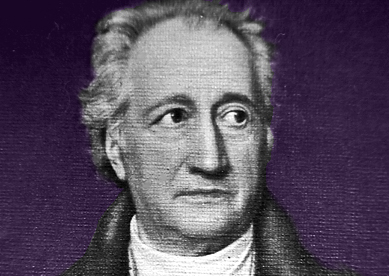
German writers such as Goethe and Schiller were a great inspiration to Thomas Carlyle, and a translation of Goethe’s Wilhelm Meister’s Apprentice is among his most important early work. In 1824, he sent Goethe a copy of this translation, beginning a long correspondence. Here, in a letter to Carlyle, Goethe tries to imagine the Scottish landscape and comments on the poems of Robert Burns.
Weimar,
25th June 1829
If only an echo could reach you and tell you every time we speak and think of you, you would very often feel you had a friendly visitor; I hope he would be welcome to sit at your cosy fireside while the snow hems you in among rocks and grassy slopes. The deep snow has often been a hindrance to us too this winter, even with our many main roads…
I do hope you will be kind enough to satisfy a wish I often voice to my distant friends. When I come to visit them in thought, I do not like to have my imagination at work in the void. So I like to ask for a drawing, a sketch of their house and its surroundings. May I make the same request now to you?
While you were living in Edinburgh, I did not venture to come and find you there. For how could I have hoped to find a quiet friend in that city of houses piled one above the other, so often pictured and yet still something of a mystery to me. But now you have moved, I have often tried to imagine the valley of the Nith with Dumfries on the left bank. From your description I take it that your house lies on the right bank, with the granite mountains hemming you in on the east. I have looked at all the detailed maps I could get, and am an experienced enough geologist to gain a general notion of the place. But that cannot show one what is characteristic about it. So please send me a drawing of your house as it stands toward the hills, and another with the view from your windows towards the valley and the river ad in the direction of Dumfries. Perhaps you or your gifted wife could do a few of these drawings yourselves; or perhaps some visitor might be kind enough to do them. For I only mean a sketch, and we all know and have proof that the talent for sketching is universal in Britain.
I know enough of your countryman Burns to think highly of him; if he were still alive he would be your neighbour now. Your mentioning him in your letter is making me read his poems again and in particular the story of his life—most distressing reading, however, like the story of so many highly talented men.
We very seldom find the poetic gift united with the gift for ordering one’s life and maintaining a certain position.
His poems showed me an independent spirit, able to seize the passing moment firmly and at the same time to see its cheerful side. I am afraid I could only appreciate this in a few of his poems, for the Scottish dialect at once confuses me and I have not time and opportunity to seek explanation of the details.
This has been lying, like a number of other letters to my best friends, among my ‘Expediendis’, but I shall send it off now at last, to tell you too I am despatching a small chest with the fourth and fifth instalment of my works. I hope this letter and what is following will find you and your dear wife well and happy and that we shall hear from you soon. Greetings from us all; the women-folk are putting in a little something.
FURTHER READING
Learn more about Carlyle and Goethe’s relationship here and read a collection of their letters here.
To see the drawing of Craigenputtock featured on the frontispiece of Goethe’s translation of Carlyle’s The Life of Friedrich Schiller, click here. More images and information about the estate can be found here.


